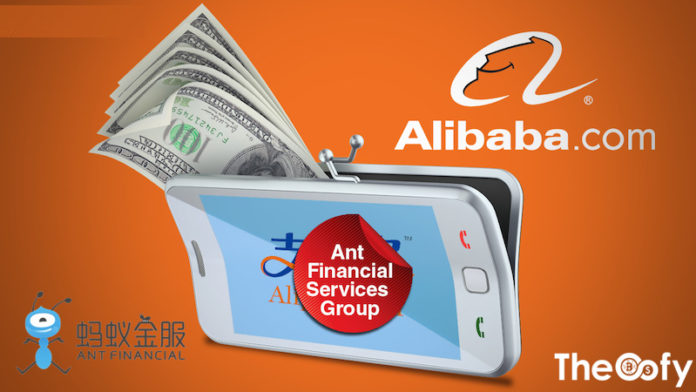Ant Financial fintech affiliate raises $14 billion to continue its global expansion
Ant Financial’s latest $14 billion funding round reportedly values the Alibaba affiliate at $150 billion, far more than Goldman Sachs’ $88 billion.
The Chinese financial services company grew out of Alipay, the digital payments system that contributed significantly to Alibaba’s ability to succeed in e-commerce.
Ant Financial’s main businesses today include mobile payments through Alipay, the largest money market fund in the world and loans.
Ant Financial, the financial services affiliate connected to Alibaba which operates the Alipay mobile payment service, has confirmed that it has closed a Series C funding round that totals an enormous $14 billion.
The rumors have been flying about this huge financing deal for the past month or so, with multiple publications reporting that Ant — which has been strongly linked with an IPO — was in the market to raise at least $9 billion at a valuation of upwards of $100 billion. That turned out to be just the tip of the iceberg here.
The money comes via a tranche of U.S. dollar financing and Chinese RMB from local investors. Those names include Singapore-based sovereign funds GIC and Temasek, Malaysian sovereign fund Khazanah Nasional Berhad, Warburg Pincus, Canada Pension Plan Investment Board, Silver Lake and General Atlantic.
Ant said that the money will go towards extending its global expansion (and deepening its presence in non-China markets it has already entered), developing technology and hiring.
“We are pleased to welcome these investors as partners, who share our vision and mission, to embark on our journey to further promote inclusive finance globally and bring equal opportunities to the world. We are proud of, and inspired by, the transformation we have affected in the lives of ordinary people and small businesses over the past 14 years,” Ant Financial CEO and executive chairman Eric Jing said in a statement.
Alibaba itself doesn’t invest in Ant, which it span off shortly before its mega-IPO in the U.S. in 2014, but the company did recently take up an option to own 33 percent of Ant’s shares.
Ant has long been tipped to go public. Back in 2016 when it raised a then blockbuster $4.5 billion — little did we know it would pull in many multiples more — the company has been reportedly considering a public listing, but it instead opted to raise new capital at a valuation of $60 billion.
It looks like the same again, but with higher stakes. This new Series C round pushes that valuation up to $100 billion, according to Bloomberg. (Ant didn’t comment on its valuation.) So what has Ant done over the past two years to justify that jump?
It has long been a key fintech company in China, where it claims to serve offer 500 million consumers and offers Alipay, digital banking and investment services, but it has begun to replicate that business overseas in recent years. In particular, it has made investments and set up joint-ventures and new businesses in a slew of Asian countries that include India, Thailand, Korea, Indonesia, Hong Kong, Malaysia, the Philippines, Pakistan and Bangladesh.
Alipay — Similar to how PayPal processes payments for eBay, Alipay handles transactions on Alibaba’s Taobao and Tmall e-commerce platforms. But Alipay has expanded to supporting mobile payments in stores and restaurants, a trend that has taken off in the last few years and essentially eliminated the need for cash in China.
Alipay has 870 million active users, with nearly a third outside China, a company representative said. It’s possible to use the mobile pay app in parts of the U.S. as well.
Yu’e Bao — The operator of the largest money market fund in the world lets consumers invest with as little as one yuan (16 cents) and can offer interest rates of nearly 4 percent or more. It has more than 400 million users and launched two new funds in May. The oldest fund, run by Tianhong Asset Management, launched in 2013 and had 1.7 trillion yuan in assets at the end of March, according to Reuters.
Integration with Alipay often means users of the mobile payments app will store their spare change with Yu’e Bao. It’s name literally means “leftover treasure.”
Zhima Credit — Beijing is trying to develop a social credit system. Ant Financial’s Zhima Credit has created a private credit platform. A spokesperson for the company said the service is not contracted to run, nor is it a private version of the government system. Ant Financial also noted Zhima Credit is an opt-in feature for Alipay users.
Zhima Credit tracks bill payments, spending habits, friends’ scores and other personal information to algorithmically produce an individual’s score. The platform offers perks to users with good numbers, while denying services such as train ticket purchases to those with bad scores.
The company was, however, unsuccessful in its effort to buy MoneyGram after the U.S. government blocked the $1.2 billion deal.
On the business-side, Ant is said to have posted a $1.4 billion profit over the last year, suggesting it is more than ready to make the leap to being a public firm.
Despite that U.S. deal setback, Ant said today that its global footprint extends to 870 million consumers. I’d take that with a pinch of salt at this point since its business outside of China is in its early stages, but there seems little doubt that it is on the road to replicating its scale in its homeland in many parts of Asia. Raising this huge round only solidifies those plans by providing the kind of capital infusion that tops most of the world’s IPOs in one fell swoop. Sources: Techcrunch, CNBC, Axios




